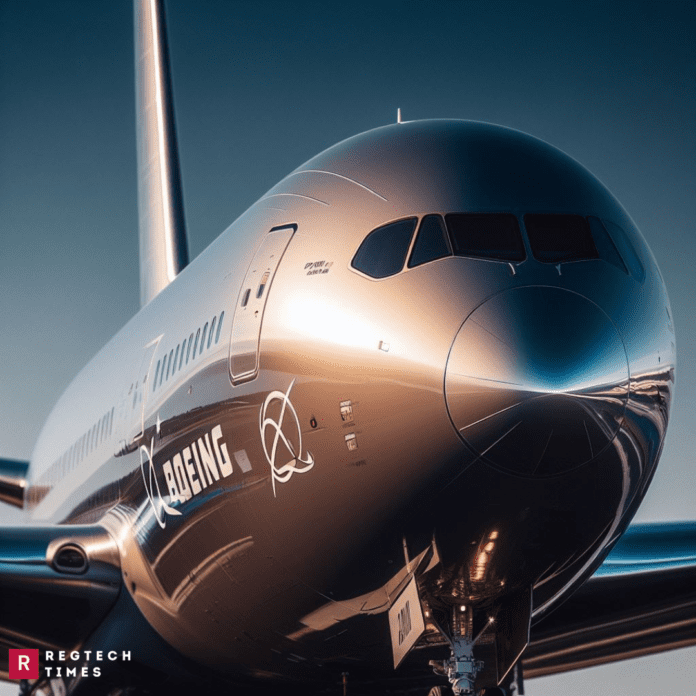In a dramatic turn of events, aerospace giant Boeing finds itself under the legal microscope once again. The US Justice Department has issued a stern notification, alleging that Boeing breached the terms of its 2021 deferred prosecution agreement.
This prosecution agreement had shielded the company from criminal charges stemming from the tragic 737 Max crashes that claimed hundreds of lives. Now, Boeing’s compliance with the agreement is under scrutiny, potentially jeopardizing its standing and reputation in the aviation industry.
The Deferred Prosecution Agreement
The 2021 deferred prosecution agreement was a pivotal moment for Boeing, allowing it to avoid criminal liability in connection with the Lion Air and Ethiopian Airlines disasters. In exchange, Boeing agreed to pay hefty penalties totalling $2.5 billion and committed to overhauling its safety and compliance protocols. However, recent events have cast a shadow over the company’s adherence to these obligations.
Breaches and Escalating Concerns
The breach notification from the Justice Department follows a series of troubling safety incidents involving Boeing aircraft. Among these was the alarming incident in January, where a door plug detached from an Alaska Airlines flight shortly after takeoff. This, coupled with other safety missteps earlier in the year, has raised serious questions about Boeing’s commitment to safety and regulatory compliance.
Potential Ramifications and Legal Proceedings
The implications of this breach are grave for Boeing. The Justice Department has indicated that the company could now face criminal prosecution for any federal violations. While the Biden administration has yet to chart its course of action, Boeing has been given until June 13 to respond to the breach and outline its remedial actions. The ultimate decision on prosecution will be communicated to the court by July 7.
Calls for Accountability
Families of the victims of the Lion Air and Ethiopian Airlines tragedies have been vocal in their criticism of the deferred prosecution agreement. They argue that it denies them the justice they seek for their loved ones’ untimely deaths. These sentiments were echoed by attorney Paul Cassell, representing the families, who described the agreement as “rigged” and brokered without their input.
Stakeholder Engagement and Next Steps
The Justice Department has pledged to engage with the families of crash victims and other airline customers as it navigates this complex legal landscape. A meeting with the families is scheduled for May 31, where further discussions on the matter are expected to take place. Meanwhile, the Justice Department continues its investigation into Boeing’s operations, particularly in light of the recent safety lapses.
Boeing’s Troubled Track Record
Despite its assurances to improve safety measures, Boeing has faced a litany of challenges in recent years. From the discovery of empty tequila bottles inside Air Force One jets to delays in 737 Max deliveries due to manufacturing issues, the company’s reputation has been tarnished by a string of controversies. Regulatory bodies have also raised concerns about Boeing’s production practices and engine safety, further exacerbating the company’s woes.
Looking Ahead: Uncertainty and Reckoning
As Boeing grapples with the fallout from the breach notification, uncertainty looms over its future. The potential for criminal prosecution adds another layer of complexity to an already fraught situation. Stakeholders, including investors, regulators, and the wider aviation industry, are closely monitoring developments, cognizant of the far-reaching implications of Boeing’s actions.
Conclusion
The breach of Boeing’s deferred prosecution agreement signals a critical juncture for the aerospace giant, underscoring the urgent need for accountability and reform. As legal proceedings unfold and investigations probe deeper into Boeing’s operations, the world watches closely, awaiting clarity on the company’s path forward. This breach not only highlights systemic issues within Boeing but also emphasizes the imperative of prioritizing safety standards and regulatory compliance in an industry where passenger safety is paramount.
Moving forward, Boeing faces a pivotal opportunity to rebuild trust and confidence in its brand by addressing the root causes of its compliance failures and safety lapses. Embracing a culture of transparency, accountability, and continuous improvement will be essential as the company navigates the complexities of legal scrutiny and stakeholder expectations. By engaging with affected families, airlines, and regulatory bodies in a meaningful and transparent manner, Boeing can pave the way for a safer and more resilient future in aviation.


